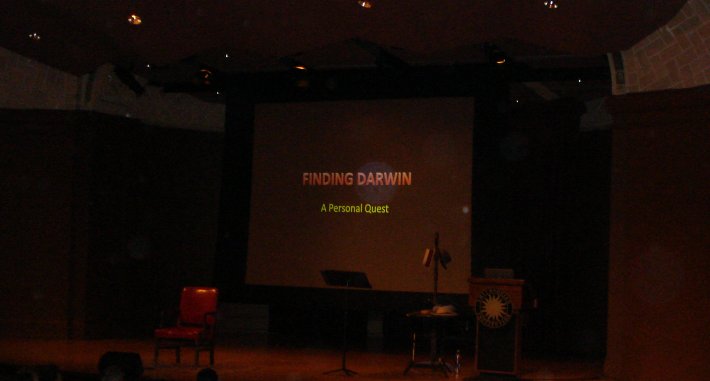
Alex and I went to see a Darwin interpreter at the Smithsonian. It was very interesting, although not exactly what I expected. Richard Milner did Gilbert & Sullivan songs about Darwin in between his story telling and interpretation.
Alex was probably the youngest person in the room, by far. I might have been in close contention for second place. I bet the median age was around sixty. Mr. Milner told lots of jokes that I understood but depended on cultural nuances from before Alex’s time. Jimmy Durante, Bing Crosby & Jack Benny survived into my time but even I know them largely through reruns of old movies. This kind of thing worries me. I also have trouble adapting new jokes. There are humor generations and it is hard to bridge that generation gap. Our references are just different.
I was crowd watching as much as performer watching. An evolution audience is peculiar and the performer pandered a bit to their prejudices. I don’t think there is any doubt that evolution explains our world, i.e. it is true scientifically. I also believe that Darwin was the greatest thinker of the 19th Century and the only one whose ideas are still broadly useful today. But I don’t partake in the Darwin hagiography and the kind of snooty superiority on display in this otherwise very polite and reasonable crowd. Dare I say that they treat Darwin with almost religious reverence.

The Darwinism of the 19th Century, i.e. the original ideas, is wrong in many details. This doesn’t really subtract from Darwin’s genius. Almost all the science of genetics, much of statistical analysis and most of the archeological record of early hominids was unavailable to Darwin. You can look at this in two different ways. Accolades say that it shows Darwin’s prescience and genius that he could still get so much right even w/o all that science. I would also praise Darwin’s skill, but say that he was very lucky in his guesses and made some seriously unscientific extrapolations that turned out well. We don’t have to believe that man was some sort of superman. We can still admire him.
Speaking of supermen, this is another problem with overdoing Darwin. Darwinism is closely associated with scientific racism, Nazism, abusive eugenics and so called social Darwinism. Darwin didn’t take part in this and he didn’t foresee it. You could say that all these things are ignorant misinterpretations of Darwin, and you would be right.
But when you look at something in totality, you have to consider what will become of it when it faces the grit and error of the real world. Academics argue academic theories that are manifest nowhere in reality. Reality matters. The best example of how reality can turn a minor intellectual pathogen into a deadly disease is Marxism. In theory, Marxism is just kind of silly. In practice it is deadly. Darwinism was not like this, but it was abused in the service of politics.
Let me make one small note about evolution. The common conception of it is … wrong and that is one of the reasons why the theory got abused. If you look at the various charts and timelines, you think that evolution is moving toward a goal. In fact, evolution doesn’t imply progress in any way. Fitness means only that organisms have reproductive success. In modern terms, the “Octomom” is the most successful and fittest human woman of our age and perhaps the most successful of any age. She evidently has fourteen children with a good chance of surviving into adulthood. Some sleaze who fathers a dozen kids out of wedlock is fitter than the childless Noble prize winner – kind of depressing. The related wrong idea is that species evolve from each other with the idea of progress, so that a fish or a frog is lower on the evolutionary ladder than monkey or a man. In fact, the science of evolution doesn’t have anything to do with this kind of idea. The fish that successfully reproduces is more successful than a man who doesn’t.
Anyway, I take the pragmatic approach to knowledge. We can never find absolute truth. Science cannot give that to us, since science is in the process of becoming. It is always in revision. We can, however, achieve USEFUL knowledge and that is enough for most of us most of the time. Just never get too enthusiastic about any particular ideas, don’t attribute infallibility to any human and don’t hold that lack of infallibly against them.
Even a genius is wrong most of the time because to err is human. And that is why I don’t feel it is a contradiction to believe in both science and transcendence.

Above is sunset from my office window behind the construction of the Institute of Peace.
BTW – I found a good article on this subject after I wrote this. It is at this link.
